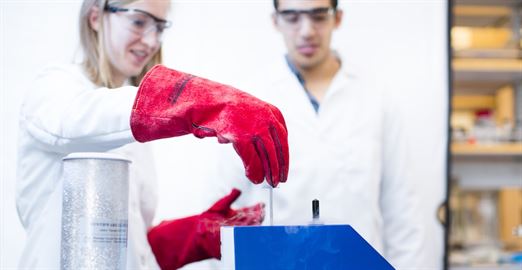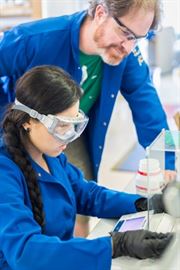
It’s a startling statistic: Nearly 30 percent of UC Merced students who start their college careers in the School of Natural Sciences (SNS) switch to majors outside the science, technology, engineering and math (STEM) fields by their second year.
But a new five-year, $1.5 million grant from the National Science Foundation (NSF) will help chemistry Professor Erik Menke change that. Menke, the principal investigator on the grant, believes the problem stems from the way introductory science courses are taught.
Notoriously difficult lower-division STEM courses — including general chemistry, required of all SNS students, and organic chemistry, required of chemistry and biology majors and medical school aspirants — have long discouraged capable students from entering STEM fields.
Menke has assembled a team of STEM faculty members — chemistry professors Christine Isborn, Hrant Hratchian, Ben Stokes, Michelle Leslie and UC Merced Extension Director of Education Programs Lynn Reimer — to come up with a new approach to teaching chemistry.
“It’s well-known that there are better ways to teach science than through lectures,” Menke said. “But there are significant barriers to better pedagogy, such as producing new teaching materials.”

Over the next five years, the grant will help these faculty members develop a new chemistry curriculum, one that makes these courses more approachable and does a better job of retaining students and training them to be the future of STEM.
The team plans to supplement some of the traditional chemistry lectures with online videos. By watching the videos before class, students will come to class having already been exposed to the material, allowing class time to be used for engaging, interactive activities that reinforce and clarify chemistry concepts. Upper-division chemistry undergraduates will be the voice of these videos, helping students connect with their peers and to build a sense of community within STEM majors.
Menke and his team will also recruit recent graduates to produce “selfie stories” — videos in which UC Merced alumni explain how they use chemistry in their jobs.
“Many students don’t understand how what they learn is applicable,” Menke said. “Selfie stories will help connect the chemistry classroom to real-world careers.”
We’re hoping to see increases in retention among STEM students and increase the number of chemistry majors.
The team will also revamp the general and organic chemistry laboratory curriculum with the goal of moving away from procedure-based labs toward guided-inquiry labs that require students to think through and develop their own solutions to scientific puzzles. The new labs will also be based around the principles of green chemistry, which seek to reduce the use of harmful solvents and make chemistry more environmentally friendly.
The Chemistry Center, an on-campus tutoring center for lower-division chemistry courses that opened last year, will expand under the grant. Menke wants the center to offer tutoring for all undergraduate chemistry courses, not just the lower-division courses now on offer. He also wants to build a stronger connection between the center and the official chemistry curriculum.
The efforts outlined in the grant proposal are part of a wider trend on campus to make STEM more accessible for first-generation students and other groups that are underrepresented. It parallels the efforts of biology Professor Jennifer Manilay and SNS Dean Betsy Dumont, whose recent $1 million HHMI grant will help transform the undergraduate biology curriculum in similar ways.
“We’re hoping to see increases in retention among STEM students and increase the number of chemistry majors,” Menke said. “If we’re successful, we hope to serve as a launching pad for wider adoption and distribution of our approach.”

Senior Writer and Public Information Representative
Office: (209) 228-4406
Mobile: (209) 201-6255